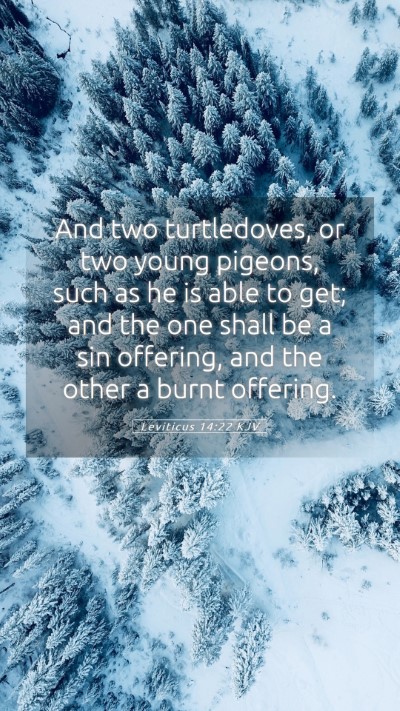Understanding Leviticus 14:22
Verse: Leviticus 14:22 - "And of the poor, he shall take two turtle doves, or two young pigeons, such as he is able to get; and the one shall be a sin offering, and the other a burnt offering."
Bible Verse Explanation
This verse provides instructions regarding the sacrificial offerings for those who are unable to afford the more expensive offerings, reflecting God's compassion towards the poor. The provision of turtle doves or pigeons signifies accessibility to worship and atonement for all, regardless of their socio-economic status.
Commentary Insights
-
Matthew Henry:
Henry emphasizes the mercy and justice that God shows in these provisions. The fact that acceptable offerings can come from humble sources indicates God's desire for a sincere heart over the ostentatious displays of wealth.
-
Albert Barnes:
Barnes notes the significance of sacrificial practices in the life of ancient Israelite society, illustrating how these rituals were foundational for maintaining the community's relationship with God. He focuses on the concept of sin offerings and the importance of atonement in the life of believers.
-
Adam Clarke:
Clarke highlights the symbolism of the two offerings, where the sin offering serves as a means of atonement and the burnt offering symbolizing devotion and total commitment to God. This duality reinforces the necessity for both repentance and dedication in the life of every believer.
Key Themes
This verse brings forth several important themes:
- The Accessibility of Worship: God provides a means for all individuals to participate in worship and presentation of offerings to Him.
- God’s Compassion: This reflects the heart of God towards those who are economically disadvantaged, ensuring they are not excluded from His grace.
- Repentance and Atonement: Emphasizing the need for both confession of sins and acts of worship as integral to a relationship with God.
- Community Practice: The concept of offerings ties individuals into the wider community of faith, showing that personal practices contribute to the corporate spirituality of Israel.
Bible Study Insights
Understanding Leviticus 14:22 within the larger context of sacrificial laws leads to profound insights. Engaging in Bible study groups can foster discussions surrounding this verse, exploring its implications on Bible study lessons, and its relevance to contemporary life.
Cross References
Related verses highlight the themes of atonement and offerings:
- Leviticus 1:14 - Discusses offerings for the poorer individuals.
- Leviticus 5:7 - Further instructions on offerings for those of lower means.
- Matthew 5:23-24 - Emphasizes the importance of reconciliation before offerings.
Application in Daily Life
Applying the insights from Leviticus 14:22 involves recognizing the avenues through which one can approach God, regardless of their current life situation. It encourages believers to:
- Reflect on their own contributions and sincerity in worship.
- Extend grace and compassion to those around them, particularly those in need.
- Understand the symbolism behind offerings and how it relates to repentance and devotion to God.
Conclusion
Leviticus 14:22 serves as a powerful reminder of God's inclusive nature and the importance of sincere worship. The meaning of Bible verses like this is not just about the historical context but also about their applications in our personal faith journeys today.


